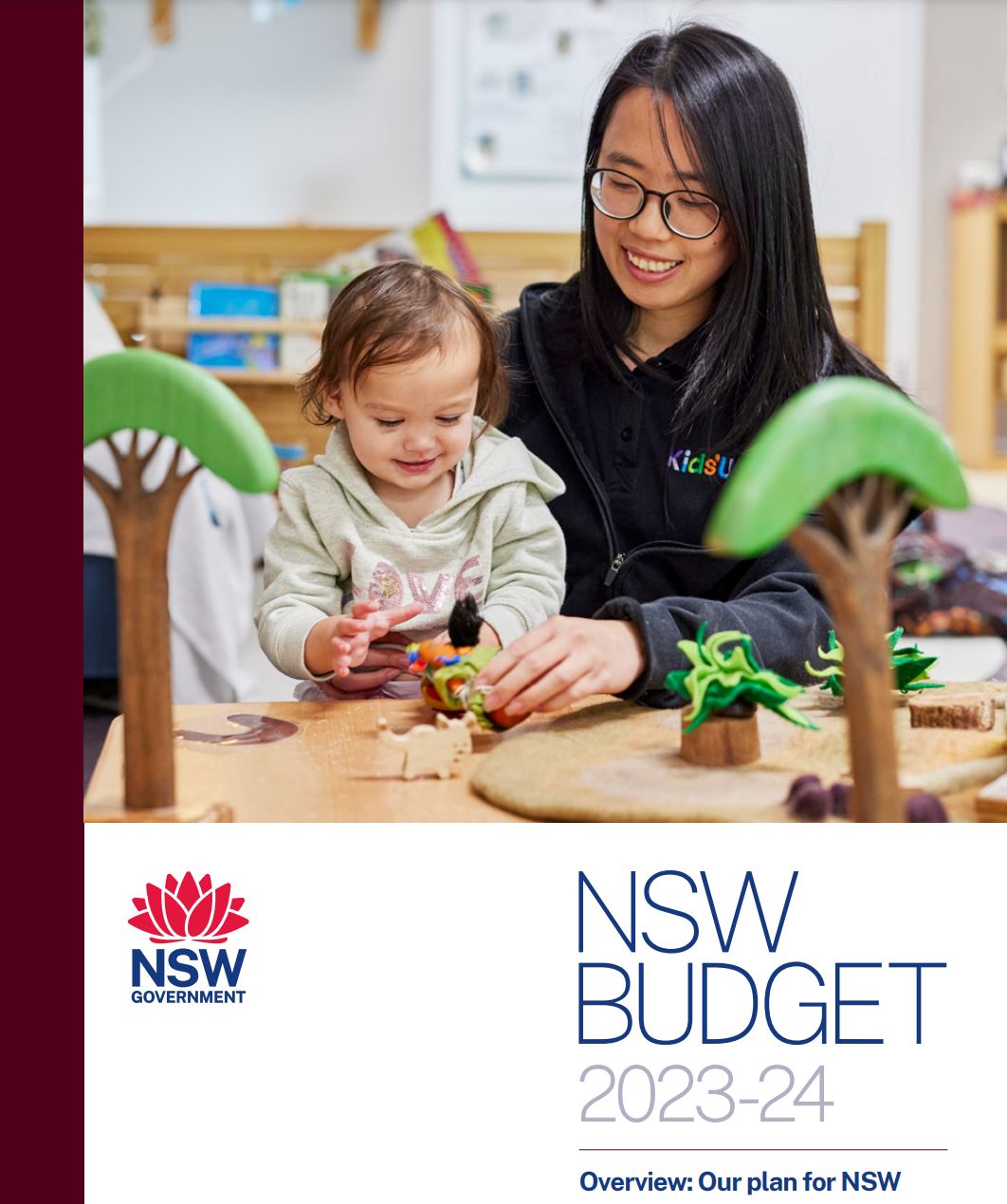The 2023-24 New South Wales State Budget was delivered today by Treasurer the Hon Daniel Mookhey MLC, who described the Labor Government’s first budget in a decade as a ‘new age of public investment that benefits the many.’
Premier Chris Minns labelled it a ‘budget of firsts’, being delivered by the state’s first Hindu Treasurer and first female Finance Minister, the Hon Courtney Houssos MLC.
As forecasted by the Treasurer in his economic statement in June 2023, the budget focused on ‘bringing inflation under control by bringing the State’s spending under control’.
The Treasurer has previously warned that the State’s finances face ‘severe challenges’ due to high inflation and rising interest rates. The last budget update in March revealed a deficit of $7.1 billion for this financial year.

Treasurer Mookhey stated that this budget was ‘paying essential workers more, and bond holders less’ by delivering a surplus on the next financial year. With a forecasted surplus, the Treasurer stated that NSW will be saving $7 billion on interest payments on 2026 projections.
The Treasurer alongside the Finance Minister today announced a small $884 million surplus for the next financial year, up from this year’s operating deficit of $7.8 billion. This is driven from revenue-driving measures as well as various reductions in expenditure.
Treasurer Mookhey stated ‘the long-term driver of our prosperity is our people,’ and advocated for a ‘new age’ of public investment. Part of the Treasurer’s speech took aim at privatisation, and highlighted various investments in public health, education, essential services and infrastructure, as well as increasing public service budgets.
State taxation revenue is forecast to increase by $17.6 billion over the four years to 2026-27, through mechanisms of increased transfer duty, land tax and payroll receipts.
Nexus APAC has summarised the key budgetary measures outlined in the budget. This briefing divides its analysis by key policy areas, including cost of living, education, environment and energy, housing, business, health, and infrastructure.
Cost of Living
A focus on cost of living measures has driven policy measures across the budget, including support for housing, energy, toll relief, caring for children and stronger and fairer communities.
In his address, Treasurer Mookhey stated, ‘the cost of living crisis [is] worse because [of] a decade of privatisation.’ The Budget Papers also forecast a $14.8 billion reduction in gross debt by June 2026, ‘without the privatisation of public assets.’
Treasurer Mookhey also signalled his government’s intention to allocate $3.6 billion to lifting public sector wages.
In line with the commitment to alleviate cost of living pressures, the NSW Government announced $8.2 billion to householders through more than 130 measures, including:
- Concessions and exemptions from transfer duty on properties valued up to $1 million for eligible first home buyers under the expanded First Home Buyer Assistance Scheme.
- A Low Income Household Rebate of up to $350 per year off electricity bills of certain Commonwealth Concession Card holders.
- Assistive technology provision for short-term or ongoing health needs through the Aids and Equipment Program.
- A one-off payment of $500 to eligible households through the National Energy Bill Relief Household Payment.
Education and Early Learning
Both the Premier and Treasurer previously confirmed that the centrepiece of this budget would be cost of living relief and childcare payments. Additional education measures include:
- $3.5 billion over 4 years for 24 new and 51 upgraded public schools to be built in Sydney’s west.
- $1.4 billion investment in 19 new and 31 upgraded schools located in regional areas.
- $769 million to establish 100 new preschools, including on the grounds of every new primary school.
- $278.4 million for a permanent literacy and numeracy tutoring programs in primary and secondary schools.
- $20 million for the Flexible Initiatives Trial, testing expanded early access to early childhood education with extended hours.
- $20 million for non-for-profit early childhood education centres located in high-growth and regional areas.
- $22 million over five years to recruit and train early childhood workers, delivering scholarships for people training to work in the industry.
- $17 million over the next year for private and Catholic schools for new classrooms, upgrades and infrastructure projects.
Environment, Energy, and Climate
The NSW State Budget turned its focus on energy relief this year, to be extended from 1 July 2024 for families, seniors, and households struggling with the cost of living. The Government also committed to:
- $2.7 billion in state revenue through increased coal royalties by 2.6 percentage points.
- $4 billion for natural disaster support and recovery programs for communities hit by floods in 2021 and 2022.
- $1.8 billion or Renewable Energy Zones and the Energy Security Corporation.
- $172 million in parks and crossings for koala habitat.
- $263.5 million to support efficient and equitable roll out of electric vehicles (EVs) through EV infrastructure.
The Government has also forecast savings of $111 million through the merging of the Greater Cities Commission and Western Parkland Authority into the NSW Department of Planning and Environment.
Housing and Property
Treasurer Mookhey announced a $2.2 billion housing package, labelling it the ‘centre’ of Labor’s first budget. The Budget Papers note that from January 2020 to May 2023, there has been a 27.6 per cent growth in housing prices in Greater Sydney, and 47.6 per cent in regional New South Wales.
In response to the progressively worsening housing crisis in NSW, the following budgetary measures were introduced:
First Home Buyers Assistance Scheme: No stamp duty for houses costing up to $800,000 and a concessional rate for houses between $800,000-1 million.
Additionally:
- $2.2 billion investment in a Housing and Infrastructure Plan.
- $300 million of this will be reinvested in Landcom for the construction of new dwellings, with 30 per cent for affordable housing.
- $224 million for Homes NSW in an Essential Housing Package.
- $30,735 discount on stamp duty for first home buyers.
- $24.0 million to establish a NSW Building Commission to support high quality housing and protect home buyers from sub-standard buildings.
- $9.1 million to assess housing supply opportunities across government-owned sites, including for the delivery of new social housing.
- $5.6 million for an artificial intelligence pilot to deliver planning system efficiencies.
Health and Emergency Services
In addition to the Government’s pre-budget commitment to boost hospital staffing shortfalls, the 2023-24 Budget promises the following measures:
- $100 million allocated to increasing women’s access to healthcare, including $34.3 million to support 20 Women’s Health Centres providing health and mental health services for women.
- $3 billion over four years on investments in Western Sydney hospitals. This includes funding to build the Rouse Hill Hospital and to build the Bankstown-Lidcombe Hospital on a new site.
- $3.8 billion will support new and upgraded regional health facilities.
- $419.1 million for an additional 1,200 nurses.
- $572.3 million over three years to enable 1,112 full-time equivalent nurses and midwives whose positions were funded temporarily to June 2024 to be made permanent.
- $121.9 million over 5 years in study subsidies in study subsidies for healthcare students.
- Each health worker will receive a $3,500 pay rise.
Transport and Infrastructure
The NSW Government unveiled an investment of $72.3 billion for transport and infrastructure-related budget measures, including:
- $7.9 billion over four years for six new Metro stations to service the future Western Sydney International Airport.
- $1 billion in Sydney Metro City and Southwest.
- $60 million investment in the Active Transport Infrastructure Program to expand cycleway networks and increase opportunities for walking.
- $390 million for a Regional Emergency Road Repair Fund and $334 million for a Regional Roads Fund to build new roads and restore damaged roads in rural and regional areas.
Other Spending
Additional budgetary measures include:
- Delivery on commitments to toll relief through a $615 million toll-relief program, and implementation of a $60 weekly toll cap for private motorists from 1 January 2024, and 33 per cent reduction in the truck toll multiplier on the M5 East and M8.
- Establishment of a $3.6 billion Essential Services Fund to support public service improvements and higher wages by negotiating workplace changes.
The 2023 – 24 Budget Papers also include a Gender Equality Budget Statement that outlines commitments to enhance the economic opportunities for women in the state.
For full details on the 2023-24 New South Wales Budget, please click here.
For additional information or to arrange a briefing, please contact the Nexus Team on +61 2 9221 9255.
Latest posts by Nexus APAC (see all)
- United Kingdom General Election 2024: An Overview - April 15, 2024
- Australian Voters Go to the Polls - February 26, 2024
- Secretaries of Federal Departments – An Overview - February 1, 2024



